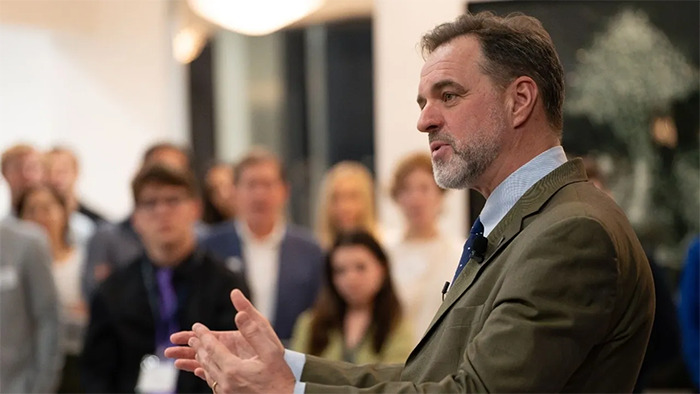
Mike Pence on Leadership and the Future of the Republican Party
Former US Vice President Mike Pence looks back on the events of January 6 2021, his final days in office with President Trump and his…
Thought Leader: Mike Pence

At the University of Austin’s inaugural reception for its founding class, historian Niall Ferguson, known for his critical essays and books on global history, delivered a thought-provoking lecture titled “After the Treason of the Intellectuals.” In this talk, Ferguson, a Founding Trustee of the university, shared insights on the current state of higher education and imparted words of wisdom to the incoming students of the class of 2028. His address, infused with references to Max Weber and featuring a backdrop symbolizing a “simulated apocalyptic landscape,” emphasized the challenges and responsibilities facing intellectuals today.
Ferguson’s lecture delved into the complexities of modern higher education, critiquing what he perceives as its failings and highlighting the potential role of new institutions like the University of Austin in addressing these issues. By drawing parallels with historical intellectual movements and invoking the spirit of Weber, Ferguson underscored the importance of academic freedom and intellectual rigor. He posited that the University of Austin aims to stand alongside esteemed institutions like Hillsdale College in championing these values.
Speaking directly to the incoming students, Ferguson’s lecture served not only as an analysis of contemporary academia but also as a motivational speech. He encouraged the young scholars to embrace the challenges ahead with courage and integrity. Ferguson’s choice of a fiery, apocalyptic backdrop for his address was symbolic of the tumultuous landscape these students are entering, yet it also represented the transformative potential of their education.
The University of Austin, through events like Ferguson’s lecture, positions itself as a beacon of hope for the future of higher education. Its commitment to fostering an environment of free inquiry and robust debate stands in contrast to the current trends in many other academic institutions. Ferguson’s involvement as a Founding Trustee and his decision to engage with the university’s inaugural class underscore the institution’s dedication to shaping thoughtful, resilient intellectuals prepared to tackle the world’s most pressing challenges.
In his lecture, Niall Ferguson not only critiqued the current state of higher education but also offered a vision for its rejuvenation. Through the lens of his extensive scholarship and global perspective, Ferguson’s address to the University of Austin’s founding class serves as a clarion call for a return to the core values of academic freedom, intellectual diversity, and rigorous debate. As these new students embark on their academic journey, they carry with them the responsibility and opportunity to redefine the landscape of higher education.
Mike Pence on Leadership and the Future of the Republican Party
Former US Vice President Mike Pence looks back on the events of January 6 2021, his final days in office with President Trump and his…
Thought Leader: Mike Pence
Marc Short on U.S. Investment in Critical Minerals
Why do critical minerals matter now? Marc Short explains how U.S. investment in critical minerals fits into a broader strategy around economic security, manufacturing, and…
Thought Leader: Marc Short
Marc Short on AI Policy and the Government’s Role in Chip Technology Investment
On CNBC, Marc Short breaks down the role of AI policy and how government investment is shaping the future of chip technology. A former Chief…
Thought Leader: Marc Short

